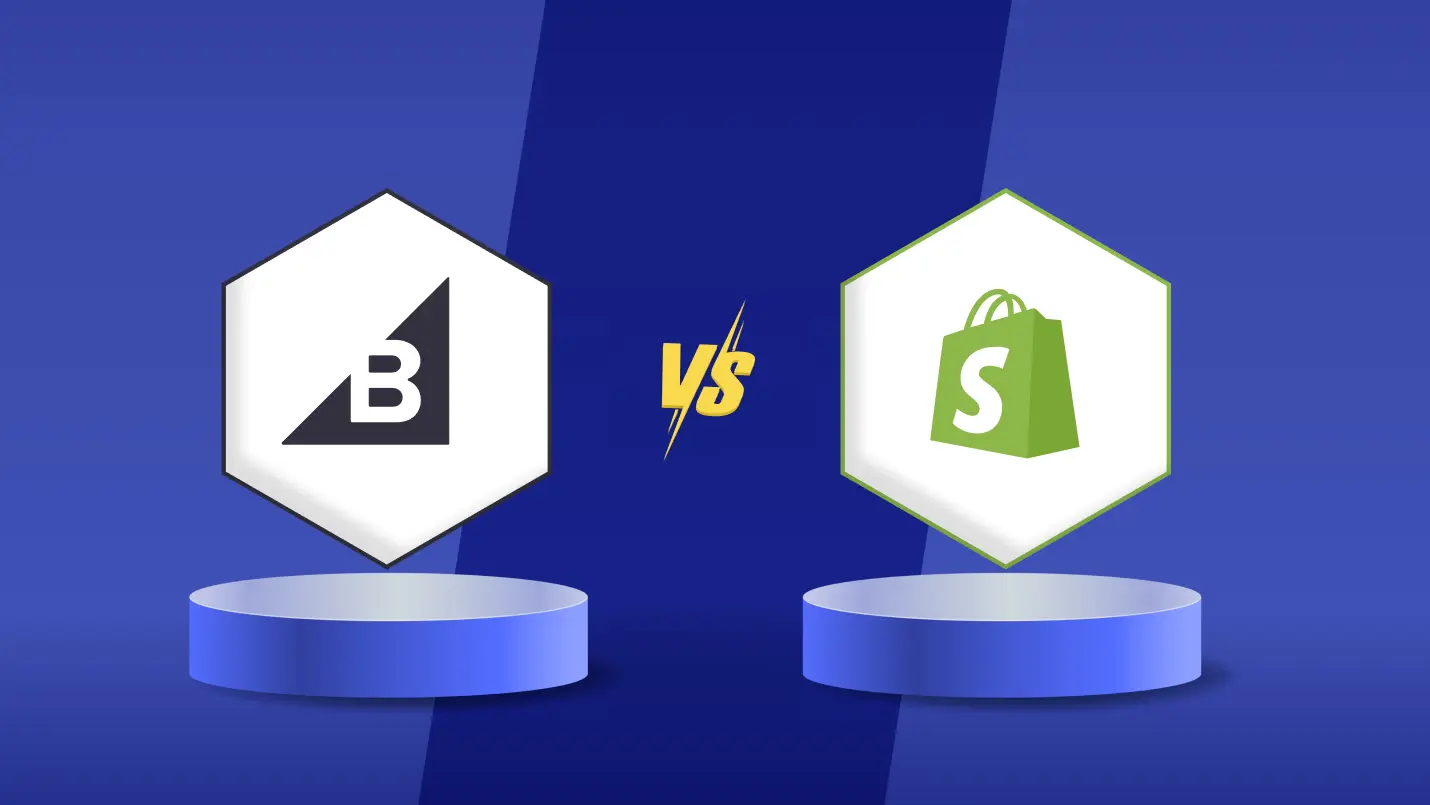Nearly half of US respondents to a recent survey plan to spend more online over the next 12 months, with eCommerce share of total US retail up from 15.1% market share in Q1 2023 to 15.6% market share by the end of 2023.
For store owners and beginner entrepreneurs looking to launch or grow digital sales, it’s important to choose an eCommerce platform that supports your business goals. Your research into the top eCommerce platforms of 2025 likely brought you to BigCommerce and Shopify, two of the most recognized eCommerce platforms.
BigCommerce and Shopify both help you build and manage online stores with little technical expertise, scale as needed, and grow cost effectively. Each platform is designed to be user-friendly, with many in-built features for small and large brands alike. In fact, both have free trials and low basic starting prices!
While Shopify may be easier out-of-the-box to start and scale and BigCommerce is ideal for large, fast-growing companies, the reality is that there are many different criteria to consider and the choice on platform really depends on your business and what features you value most.
This post will help guide individuals and businesses to make an educated decision between BigCommerce and Shopify by comparing:
- Key features
- Pricing
- Usability
- Scalability
- Security
- Service
BigCommerce vs Shopify: Quick Comparison
BigCommerce and Shopify have been breaking the mold of what’s possible in online sales for business owners, helping brands deliver experiences that global consumers are looking for. Retailers on Shopify set record sales on Black Friday ($4.2 million), including first sales from 17,500+ small business or beginner entrepreneurs, while BigCommerce customers saw a 10% year-over-year increase in gross merchandise value across this time period. It’s clear both platforms are working for their customers.
In general, Shopify is ideal for individuals or brands who want to set up a store quickly and with fewer customizations or for retailers who want to support in-person and online sales. BigCommerce is ideal for brands that want more control over features, processors, user accounts or even storefronts – a sacrifice of ease of use for more control.
Let’s take this comparison one step further:
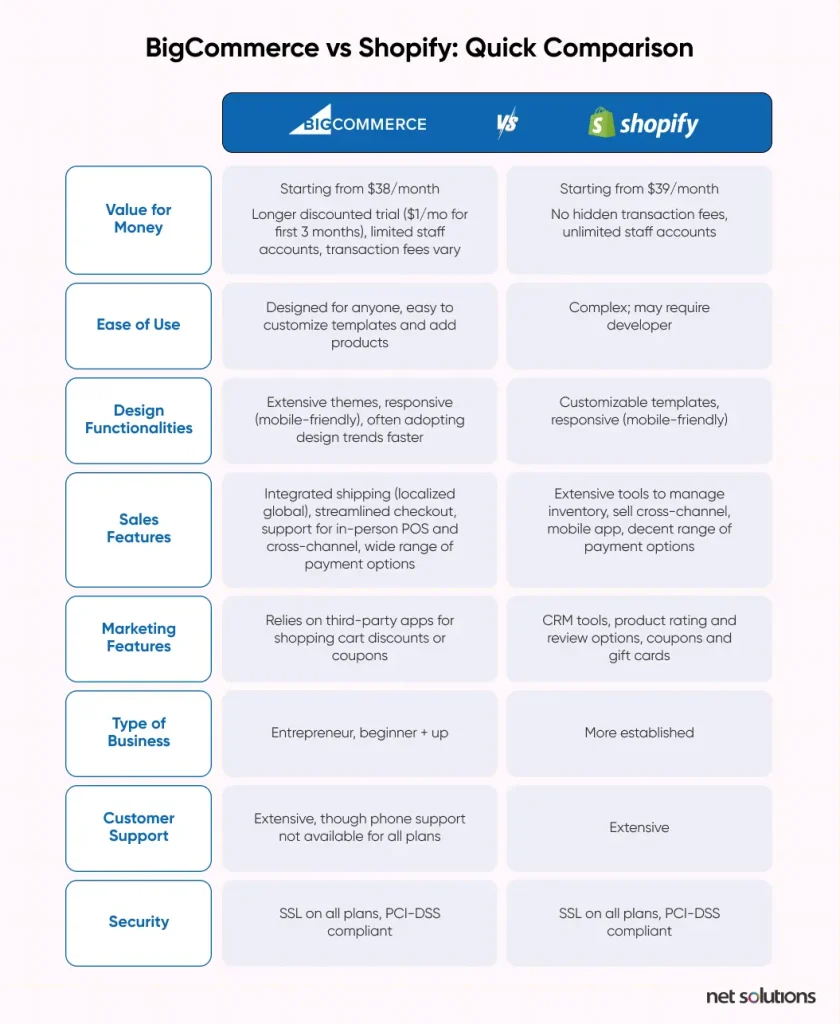
When assessing eCommerce platforms, it’s important to go a little deeper into the features, functions and services: what’s good, what’s challenging, and what you need to consider.
Before you start comparing eCommerce platforms:
First, there are different considerations whether you’re selling to other businesses and looking for the right B2B eCommerce platform or if you’re selling to consumers and looking for the best B2C eCommerce platform. Second, you might need to step back and understand your priorities. For example, if security is your highest priority, you’re going to want to know more about eCommerce security before reading this comparison post. And if you’re in a highly competitive brand space, you’ll also want to know about the latest design trends so you know what to look for when comparing features.
Now, let’s have a look under the hood of Shopify and BigCommerce.
BigCommerce vs Shopify: Pros and Cons
BigCommerce and Shopify are powerful eCommerce platforms designed to help brands quickly set up and launch online stores and omnichannel commerce experiences that span across digital platforms and in-person stores. Both platforms are designed for small and large brands, with common eCommerce features including payment options, shipping tools, security, gift cards, POS support, and gift cards. However, BigCommerce has more baked-in features – making it powerful, but a little harder to use – while Shopify leans on its app store and the use of free or paid third-party apps for some of these functions.
BigCommerce pros and cons
BigCommerce is an open software-as-a-service (SaaS) platform and headless commerce provider to help brands scale online sales with greater control over how everything comes together. What BigCommerce brings to the table in terms of its features, it sacrifices some ‘ease’ and is ideally supported with skilled developers and BigCommerce development agencies.
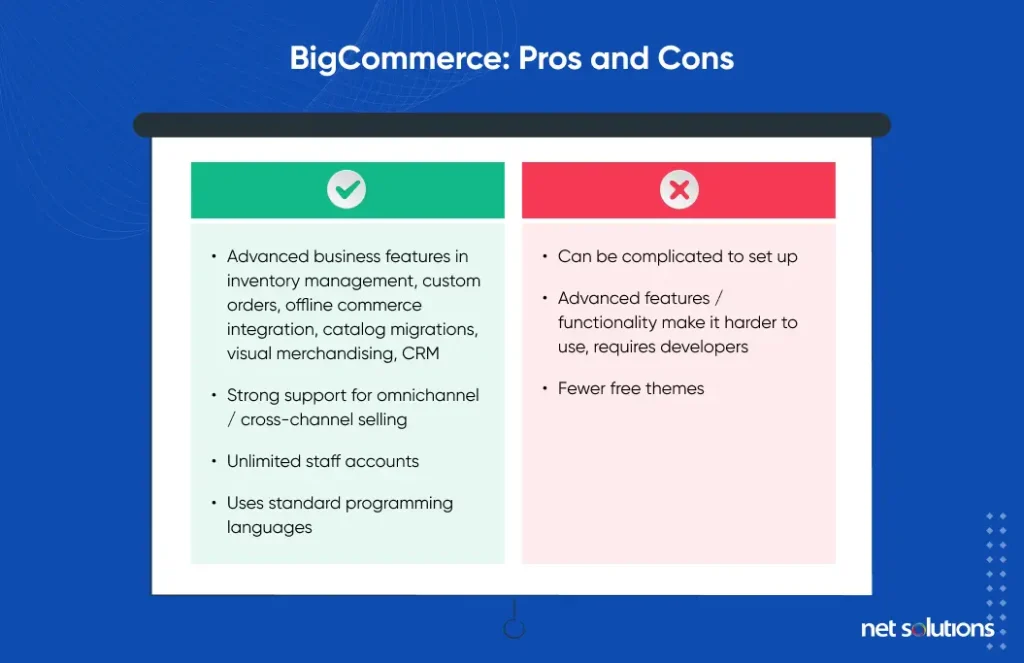
Shopify pros and cons
Shopify is a widely used eCommerce platform, known for its intuitive design and flexibility to capture brands from small entrepreneurs and small businesses to large global brands. With pricing designed to encourage trial, Shopify now supports 10% of total US eCommerce as well as $44B of global economic activity. Let’s have a look at what Shopify does well – and what its disadvantages are:
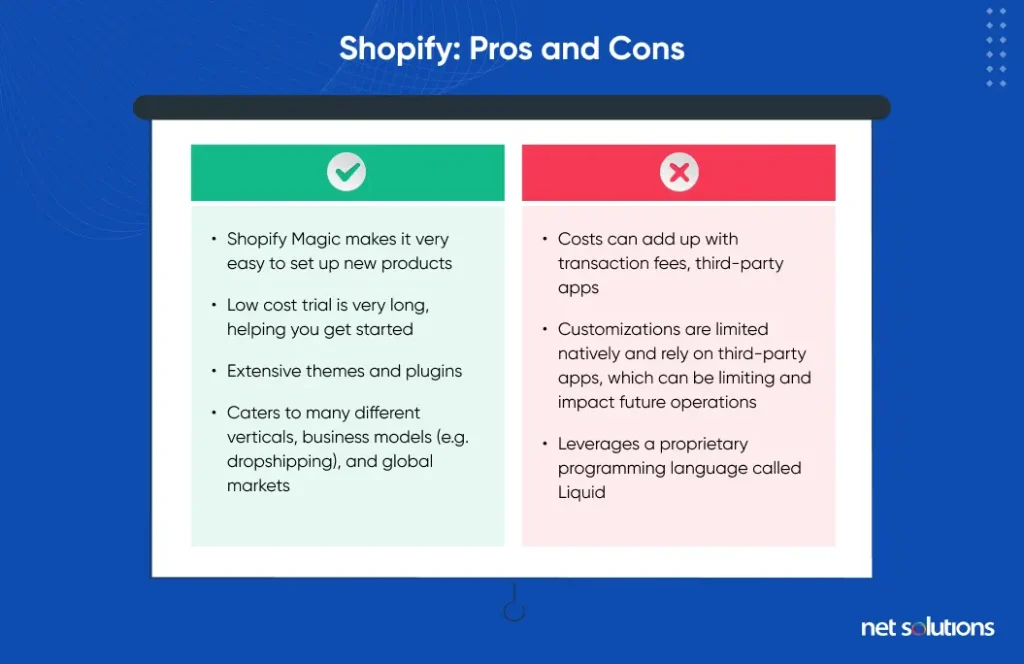
Detailed Comparison: Shopify vs BigCommerce
Shopify and BigCommerce are very different once you start looking under the hood at features, pricing and even their base architectures. Let’s examine Shopify vs BigCommerce with more detail:
Costs and pricing
BigCommerce and Shopify have similar pricing tiers, but with different features per tier to support eCommerce stores. All prices are displayed in USD, with current discounts applied (annual discount + current deals). Let’s examine these pricing plans in detail:
BigCommerce pricing and costs
BigCommerce sets itself apart by offering unlimited staff accounts and no transaction fees across all its plans. Plans incrementally add features based on store size, with changes in credit card rate, search and cart capabilities. A big differentiator is that BigCommerce doesn’t take extra fees for payments, but the move between plans is automatic based on sales.
- BigCommerce Standard – $29 / mo
Unlimited number of goods, staff accounts, and the ability to sell products and write blogs. - BigCommerce Plus – $79 / mo
The plus plan is designed for small business sales up to $180k annually, new features for abandoned cart, segmentation and stored credit cards. - BigCommerce Pro – $299 / mo
Designed for sales up to $400k annually, new features for search and SSL. - BigCommerce Enterprise – variable, $1000+ / mo
Offers more flexibility through unlimited API calls, unrestricted GMV limits, priority routing and support, and more customizations.
Shopify pricing and costs
Shopify has many different price levels, with distinguishing features between tiers including the number of staff accounts, credit card rates, checkout capacity, shipping discounts, analytic capabilities, global support, and customer support. Each Shopify plan reflects a single storefront. Pricing does not reflect the use of any third-party apps (many of which have monthly fees).
- Starter – $5 / mo * limited capabilities, high fees *
Designed for simple store capabilities for social selling only. - Basic Shopify – $29 /mo
The basic plan is discounted to $1 per month for the first month. Ideal for individual entrepreneurs or beginner businesses. Includes cart abandonment. - Shopify – $79 /mo
Ideal for small teams, up to 5 additional staff accounts. - Advanced Shopify – $299 /mo
The advanced plan is for businesses looking to scale ecommerce stores, with added support for global businesses including transparency of duties and import taxes and the capacity to add more custom markets (for a fee). - Shopify Plus – $2,300+ / mo
Designed for enterprise users making over $1M across online, retail and B2B. Support for up to 20 locations and 9 more storefronts across locations.
User-friendliness
Shopify is known to be very user-friendly, regardless of technical knowledge, but both platforms offer simple interfaces to be used to build an eCommerce store with little technical knowledge.
Ease of use for BigCommerce
BigCommerce offers infinite customizability, but at base level this can be overwhelming for novice users, a high learning curve. That said, BigCommerce is working to address this with more drag-and-drop capabilities.
Ease of use for Shopify
Shopify is designed to be easy to use for the DIY eCommerce website creator or online business owner of any level of knowledge, relying on the use of third-party apps to extend functionality on the Shopify App Store. This can at times be frustrating when larger enterprises want to extend functionality or are limited by the third-party apps.
Shopify has also recently introduced Shopify Magic, an AI tool designed to simplify workflows around image editing, product description writing and more.

Design and themes
Shopify is built on Ruby on Rails using MySQL and uses its own language, Liquid, for themes. BigCommerce relies on PHP and PostgreSQL, and leverages standard languages for its themes.
BigCommerce themes and design
BigCommerce offers a variety of themes across industries, B2B or optimized for large catalogs.There are now 241 themes listed online (though some theme families repeat with small variations), including 12 free. BigCommerce’s themes can be customized in great detail.
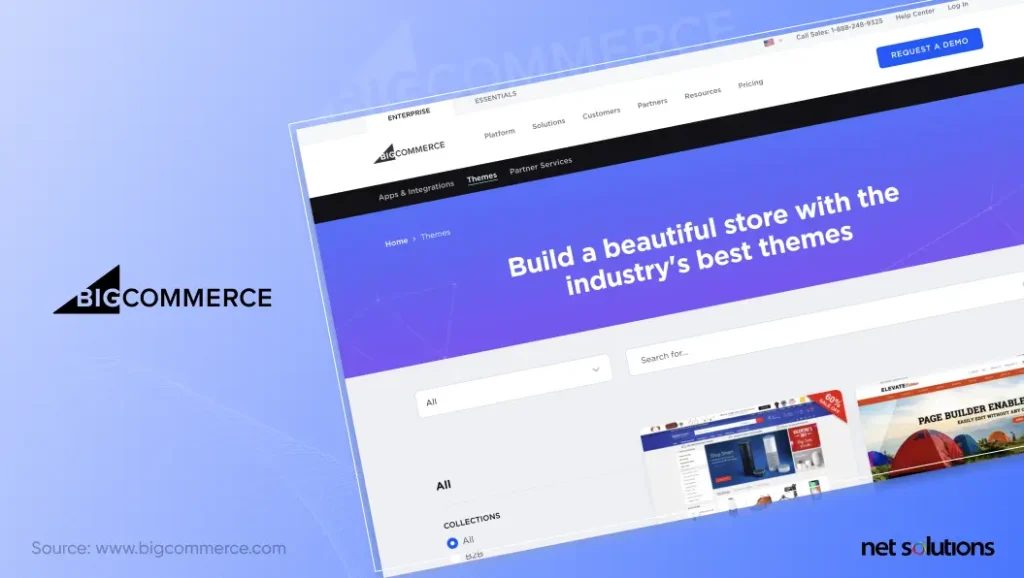
Shopify Themes and Design
Shopify offers a variety of themes, all built to a high aesthetic standard following recent design trends and optimized for selling. Although not listed as separate themes, Shopify often has several color families to choose from per theme. There are 12 free themes and 171 paid themes in its theme store.

Scalability and apps
Scalability is the ability to handle an increase in traffic, particularly sudden bursts that could come from social media, tv appearances or major sales. This is an important distinction between BigCommerce, which handles more of its own scaling, and Shopify, which uses more third-parties.
BigCommerce apps and scalability
BigCommerce will automatically push you to the next pricing tier by sales volume, but it is built to handle scaling on a very stable technology platform that is optimized for speed. BigCommerce scaling is dependent on some integrations, such as those with CRM or ERP systems that integrate pricing, customer information, etc. BigCommerce has out-of-the-box cross-channel support for eBay and Amazon and international shipping for global scaling and currencies.
BigCommerce has over 1,000 third-party apps in its BigCommerce store.
Shopify apps and scalability
Shopify is a more distributed infrastructure, relying on apps, but Shopify built its Plus infrastructure (top tier pricing) to offer the greatest resiliency to maintain peak performance, able to handle massive spikes in traffic. Although you are more reliant on third-party applications, this can also be an advantage as you can easily change system integrators to take advantage of new opportunities or support global expansion.
Shopify leverages over 6,000 apps.
Payment gateway options
Payment gateways are a distinguishing feature between the two platforms. BigCommerce works on no transaction fees, while Shopify has the option of using external gateways (fee) or its own Shopify Payments.
Shopify Payments
Shopify Payments eliminates additional transaction fees for eCommerce stores and is available in 22 countries around the world. It is optimized to make checkouts very fast and offers over 100 integrations with payment processors.
BigCommerce payments
No transaction fees for any plan. Offers 65 integrations with payment processors, including PayPal. No POS solution built in.
Sales features
Let’s talk about functionality for your eCommerce business: what you can do for selling on Shopify vs BigCommerce. Both support multichannel selling, with Shopify having more capabilities for POS or social-only sales, while BigCommerce focuses on enterprise and B2B.
Inventory management
Both eCommerce platforms allow for unlimited products.
- BigCommerce: Native inventory management, online or offline. Wider ability to offer more details about products or variations.
- Shopify: Native inventory management, great global support. New AI-enhanced tools speeds up creation of product catalogs and optimized product descriptions. More built-in features that support digital sales and cart abandonment services.
Sales channels
Today, both eCommerce platforms are optimized for multichannel sales across platforms.
- BigCommerce: Can leverage out-of-the-box integrations with Amazon, eBay and Walmart to extend to wider marketplaces.
- Shopify: Ability to sell on social platforms (solo or integrated into other plans).
Learn more about the 13 key trends shaping eCommerce in 2024.
Point-of-sale (POS)
The ability to sell in-person used to be a distinguishing feature for Shopify vs BigCommerce, but now is a common feature, both at an add-on rate.
- BigCommerce: Can integrate the POS provider of choice and sync inventory across locations. Requires third-party hardware.
- Shopify: Proprietary Shopify POS solution that can be used as an app on any iOS or Android device.
Marketing functionality
Both Shopify and BigCommerce have wide and comparable capabilities for marketing to quickly reach customers. Both offer dashboard-based reporting tools and SEO features.
Marketing tools in BigCommerce
BigCommerce doesn’t go as deep on its built-in marketing, but it does go wide on its capabilities, particularly for search engine optimization (SEO).
- Reach customers using third-party CRM integration such as MailChimp or G Suite
- Built-in search engine optimization (SEO), with granular control over metadata, images, URLs etc.
- 258 listed marketing apps to extend capabilities
Marketing tools in Shopify
Shopify stands out for its in-build Shopify Email marketing tools to manage customer relationships, particularly at the Shopify Plus level.
- Native ability to email customers from Shopify Email, built into the platform
- Built-in SEO and optimizations
- Wide availability of third-party marketing tools (e.g. Mailchimp, Automizely, Buffer, Hootsuite, editing tools, video tools, etc)
Security features
Shopify and BigCommerce both take security seriously, and as SaaS platforms take responsibility for platform maintenance and integrity. Both claim PCI-DSS compliance and use SSL certificates. As always, security is a joint activity, so take added time to protect credentials and offer security to end users.
Learn more about eCommerce security in our guide.
Security protocols in BigCommerce
- ISO/IEC 27001, SOC, FIPS 140-2 compliant, in addition to PCI DSS
- Built-in audit logging
- Strong role-based access controls
Security measures in Shopify
- All accounts have SSL certificates by default
- A hosted platform, so Shopify runs patches and updates and includes a reward program to catch vulnerabilities
- Requires two-factor authentication for Shopify Payments
- Uses risk analysis tools on orders to detect fraud
Customer support
Both Shopify and BigCommerce offer 24/7 support via email or chat, with deeper levels of customer support available at higher plans.
Customer support in BigCommerce
BigCommerce includes phone, email, and live chat support for all plan levels. Support is US-based.
Customer support in Shopify
Available in 21 languages. Phone support only available for some plans.
Deciding Between BigCommerce and Shopify
BigCommerce and Shopify are flexible, hosted eCommerce platforms that support multichannel selling and flexible design, thanks to headless commerce architecture. How can you make a choice? Let’s summarize.
When to opt for BigCommerce
BigCommerce may be the right choice for you if:
- Reason #1: You are an established brand with development resources or partnerships that can support deep customizations and flexibility
- Reason #2: You want more nuanced SEO capabilities
- Reason #3: You’re an enterprise with high volume sales across multiple channels or are B2B
When to opt for Shopify
Shopify may be right for you if:
- Reason #1: You’re an individual or small brand with no development skills and limited budget for customizations
- Reason #2: You want a wider set of third-party integrations to add speed and flexibility to your growth
- Reason #3: You’re a global B2C brand with many localized storefronts
Want to learn more?
The right platform is only right when it’s tailored to what your business needs. At Net Solutions, we work closely with our customers to understand what you need and bring a deep understanding of major eCommerce platforms to the table, including Shopify and BigCommerce. We optimize every aspect of your presence to engage customers across multiple channels and deliver on your promise.
Discover more about how to tailor eCommerce website solutions for your business with Net Solutions.
Frequently Asked Questions
Although this question depends on the focus of the large store (B2B and B2C), BigCommerce offers more built-in features and deeper customizations to scale large brands.
Although both platforms can be used by smaller stores, Shopify typically comes out as top rated by individuals or smaller brands since it is very intuitive to use and has many easy and well-designed templates. If you expect to grow quickly or scale internationally, consider the decision more carefully.
The number of products does not change the price option between Shopify or BigCommerce, in terms of the best ecommerce platforms, but likely most limited range brands would prefer Shopify due to the ease of setup.

